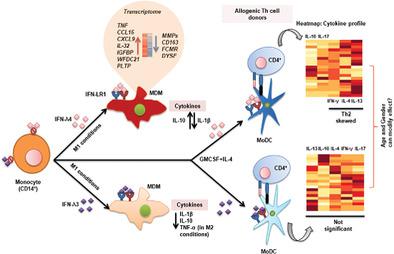当前位置:
X-MOL 学术
›
J. Leukoc. Biol.
›
论文详情
Our official English website, www.x-mol.net, welcomes your feedback! (Note: you will need to create a separate account there.)
Monocytes differentiated into macrophages and dendritic cells in the presence of human IFN-λ3 or IFN-λ4 show distinct phenotypes
Journal of Leukocyte Biology ( IF 5.5 ) Pub Date : 2020-11-17 , DOI: 10.1002/jlb.3a0120-001rrr Manjarika De 1 , Anand Bhushan 1 , Sreedhar Chinnaswamy 1
Journal of Leukocyte Biology ( IF 5.5 ) Pub Date : 2020-11-17 , DOI: 10.1002/jlb.3a0120-001rrr Manjarika De 1 , Anand Bhushan 1 , Sreedhar Chinnaswamy 1
Affiliation

|
Human IFN-λ4 is expressed by only a subset of individuals who possess the ΔG variant allele at the dinucleotide polymorphism rs368234815. Recent genetic studies have shown an association between rs368234815 and different infectious and inflammatory disorders. It is not known if IFN-λ4 has immunomodulatory activity. The expression of another type III IFN, IFN-λ3, is also controlled by genetic polymorphisms that are strongly linked to rs368234815. Therefore, it is of interest to compare these two IFNs for their effects on immune cells. Herein, using THP-1 cells, it was confirmed that IFN-λ4 could affect the differentiation status of macrophage-like cells and dendritic cells (DCs). The global gene expression changes induced by IFN-λ4 were also characterized in in vitro generated primary macrophages. Next, human PBMC-derived CD14+ monocytes were used to obtain M1 and M2 macrophages and DCs in the presence of IFN-λ3 or IFN-λ4. These DCs were cocultured with CD4+ Th cells derived from allogenic donors and their in vitro cytokine responses were measured. The specific activity of recombinant IFN-λ4 was much lower than that of IFN-λ3, as shown by induction of IFN-stimulated genes. M1 macrophages differentiated in the presence of IFN-λ4 showed higher IL-10 secretion than those differentiated in IFN-λ3. Coculture experiments suggested that IFN-λ4 could confer a Th2-biased phenotype to allogenic Th cells, wherein IFN-λ3, under similar circumstances, did not induce a significant bias toward either a Th1 or Th2 phenotype. This study shows for the first time that IFN-λ4 may influence immune responses by immunomodulation.
中文翻译:

在人 IFN-λ3 或 IFN-λ4 存在下分化成巨噬细胞和树突状细胞的单核细胞表现出不同的表型
人类 IFN-λ4 仅由在二核苷酸多态性 rs368234815 处具有 ΔG 变体等位基因的个体子集表达。最近的遗传研究表明 rs368234815 与不同的感染性和炎症性疾病之间存在关联。不知道 IFN-λ4 是否具有免疫调节活性。另一种 III 型干扰素 IFN-λ3 的表达也受与 rs368234815 密切相关的遗传多态性控制。因此,比较这两种 IFN 对免疫细胞的影响是有意义的。在此,使用 THP-1 细胞,证实 IFN-λ4 可以影响巨噬细胞样细胞和树突状细胞 (DC) 的分化状态。由 IFN-λ4 诱导的全局基因表达变化也在体外产生的原代巨噬细胞中进行了表征。接下来,人类 PBMC 衍生的 CD14+单核细胞用于在存在 IFN-λ3 或 IFN-λ4 的情况下获得 M1 和 M2 巨噬细胞和 DC。这些 DC 与来自同种异体供体的CD4 + Th 细胞共培养,并测量了它们的体外细胞因子反应。重组 IFN-λ4 的比活性远低于 IFN-λ3,如 IFN 刺激基因的诱导所示。在 IFN-λ4 存在下分化的 M1 巨噬细胞比在 IFN-λ3 中分化的巨噬细胞显示出更高的 IL-10 分泌。共培养实验表明 IFN-λ4 可以赋予同种异体 Th 细胞偏向 Th2 的表型,其中 IFN-λ3 在类似情况下不会诱导对 Th1 或 Th2 表型的显着偏向。该研究首次表明 IFN-λ4 可能通过免疫调节影响免疫反应。
更新日期:2020-11-17
中文翻译:

在人 IFN-λ3 或 IFN-λ4 存在下分化成巨噬细胞和树突状细胞的单核细胞表现出不同的表型
人类 IFN-λ4 仅由在二核苷酸多态性 rs368234815 处具有 ΔG 变体等位基因的个体子集表达。最近的遗传研究表明 rs368234815 与不同的感染性和炎症性疾病之间存在关联。不知道 IFN-λ4 是否具有免疫调节活性。另一种 III 型干扰素 IFN-λ3 的表达也受与 rs368234815 密切相关的遗传多态性控制。因此,比较这两种 IFN 对免疫细胞的影响是有意义的。在此,使用 THP-1 细胞,证实 IFN-λ4 可以影响巨噬细胞样细胞和树突状细胞 (DC) 的分化状态。由 IFN-λ4 诱导的全局基因表达变化也在体外产生的原代巨噬细胞中进行了表征。接下来,人类 PBMC 衍生的 CD14+单核细胞用于在存在 IFN-λ3 或 IFN-λ4 的情况下获得 M1 和 M2 巨噬细胞和 DC。这些 DC 与来自同种异体供体的CD4 + Th 细胞共培养,并测量了它们的体外细胞因子反应。重组 IFN-λ4 的比活性远低于 IFN-λ3,如 IFN 刺激基因的诱导所示。在 IFN-λ4 存在下分化的 M1 巨噬细胞比在 IFN-λ3 中分化的巨噬细胞显示出更高的 IL-10 分泌。共培养实验表明 IFN-λ4 可以赋予同种异体 Th 细胞偏向 Th2 的表型,其中 IFN-λ3 在类似情况下不会诱导对 Th1 或 Th2 表型的显着偏向。该研究首次表明 IFN-λ4 可能通过免疫调节影响免疫反应。


























 京公网安备 11010802027423号
京公网安备 11010802027423号